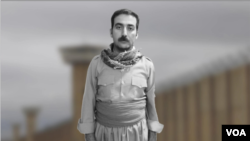Iran has withheld confirmation of its apparent recent execution of a Kurdish activist, in the latest example of its long-running practice of secretly executing ethnic minority dissidents.
Kurdish activist Hedayat Abdollahpour’s brother Farhad told VOA Persian that their father received a call on June 10 from an official who asserted that Hedayat was executed on or around May 21 in the northwestern town of Oshnavieh.
Farhad Abdollahpour, who is based in neighboring Iraqi Kurdistan, reported that the caller said his brother Hedayat had been transferred to Oshnavieh for execution from a prison in Urmia, another northwestern Iranian city where the dissident had been on death row since 2017. He told VOA Persian that his brother’s two lawyers had yet to receive any written confirmation of the apparent execution from Iranian judicial authorities as of Friday.
Iranian law requires the government to notify lawyers of a scheduled execution of their client 48 hours in advance and to grant families the right to visit their condemned relative for the last time. It appears Iranian authorities failed to observe the law in Hedayat Abdollahpour’s case.
Abdollahpour was detained in August 2016 for suspected involvement in a battle between Iran’s Islamic Revolutionary Guard Corps (IRGC) and Kurdish Democratic Party of Iran (KDPI) rebels on June 14 of that year. He was accused of being a KDPI member and sentenced to death in 2017 after what Britain-based rights group Amnesty International (AI) called a “grossly unfair” trial.
AI and Abdollahpour’s family have said the dissident consistently denied involvement with KDPI or its 2016 battle with the IRGC. They also said he lost hearing in one ear from apparent torture after his arrest and later retracted in court a confession that he had made under duress.
In another indication that Abdollahpour recently was executed without an official announcement, an Iranian-government-approved Kurdish news site, AkamNews.com, published a report on Sunday, quoting an unnamed security official as saying the dissident had been hanged during the Persian month of Khordad, which runs from May 21 to June 20.
Neither of Abdollahpour’s two lawyers, Maziar Tataei and Osman Mazayyan, responded to requests from VOA Persian for comment on the case.
Hossein Ahmadiniaz, a third Iranian lawyer, who represented Abdollahpour in the past and who has lived in exile in the Netherlands since 2018, told VOA Persian that his two colleagues have said little publicly about the case due to government pressure. Iran has jailed several lawyers in recent years, charging them with national security offenses for their peaceful defenses of similarly peaceful activists.
“We know that Abdollahpour’s execution has been carried out, but we cannot declare it legally and officially,” Ahmadiniaz said.
Rights groups say Iran has a history of secretly executing Kurdish and other ethnic minority dissidents and refusing to reveal the location of the dissidents’ graves after notifying their families of the executions.
Ahmadiniaz said what made Abdollahpour’s apparent execution unusual is that there has been no government confirmation of it for almost a month after it purportedly happened. He cited a previous case in which he had represented Ramin Hossein Panahi, a Kurdish activist secretly executed by the government in September 2018. The lawyer said the Iranian judiciary at his urging later issued a statement about Panahi’s execution and allowed relatives to briefly see the dissident’s body before burying him at an undisclosed site.
In a June 11 statement, AI called on Iran to urgently clarify what happened to Abdollahpour and accused Tehran of committing a crime of enforced disappearance in violation of international law.
In a sign of the anguish facing Abdollahpour’s family, his father, Abubakar, sent a voice message Monday to Oslo-based group Iran Human Rights, pleading with Iranian judiciary chief Ebrahim Raisi for information about the dissident.
“Shame on you. If you have executed my child, return his body. Set Islam aside and be a human,” he said.
Abdollahpour’s brother Farhad, speaking to VOA, vowed that the family will not acknowledge that the activist has been executed until a government announcement is made.
This article originated in VOA’s Persian Service. Mehdi Jedinia of VOA’s Extremism Watch Desk contributed. Click here for the original Persian version of the story.




